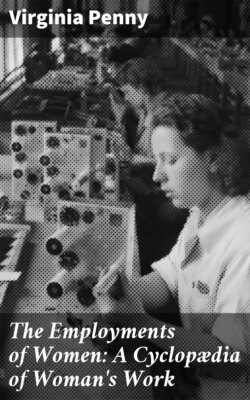Читать книгу The Employments of Women: A Cyclopædia of Woman's Work - Virginia Penny - Страница 8
На сайте Литреса книга снята с продажи.
2. Astronomers.
ОглавлениеTable of Contents
Maria Cunitz is mentioned as an astronomer of the seventeenth century in Germany. Miss Caroline Herschel discovered two moons and several comets. Miss Maria Mitchell, of Nantucket, Mass., discovered a new planet, and received, in consequence, a medal from the King of Denmark. She formerly observed for the Coast Survey, but was not officially recognized. She computes for the Nautical Almanac. She writes: "I know of no lady astronomers who are practical observers. Very good works have been written on the subject by women. An observing room is never warmed by a fire; and as a small part, at least, of the roof must be opened to the air, the exposure is according to the weather, as the observations must be made in clear evenings. I do not consider the danger to the health great. I know of no way in which astronomical observations can be made to pay women. They could, without doubt, make better observers than men, with the same amount of practice. The same delicacy of touch and of perception that makes them good at the needle, would make them efficient in the delicate manipulations of the micrometer. But I know of no man well paid as an observer only. There are always volunteer candidates in this department of an observatory. Women can make as good computations as men, and do their work more neatly; but here, also, the field is occupied by men, although, I think, never as volunteers without pay. I have no doubt many of the computations professedly made by men, are really the work of women employed as assistants. This has always been the case in the long and tedious computations made for astronomical objects in the early efforts of the science. My own observatory is wholly a private affair, and supported entirely by my own means, which are my daily earnings as computer to the Nautical Almanac. I employ no assistant." I am happy to say Miss Mitchell receives the same salary for the observations and reckonings of the Nautical Almanac that would be given to a man. In 1856, at the Smithsonian Institute, a paper was read by Professor Foote, on the heat of the sun's rays; after which a paper by Mrs. Foote was read by Professor Henry, giving an account of experiments made by herself on the same subject. Miss Harriet Bouvier (now Mrs. Peterson) has written a very good work on astronomy for schools. Mrs. Somerville, a distinguished astronomer of England, has added much information to the science by her discoveries. "Miss Anne Sheepshanks, sister to the late astronomer, has been elected a fellow of the Astronomical Society."
